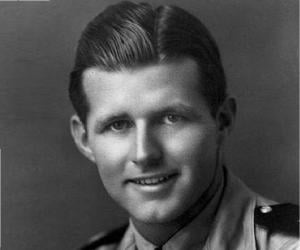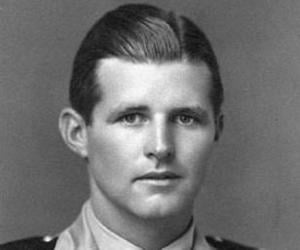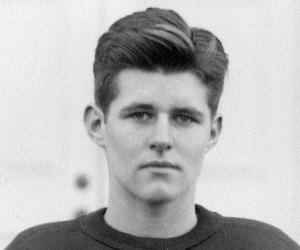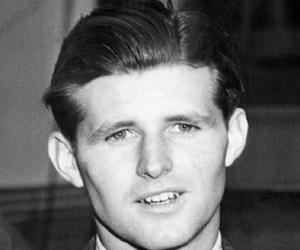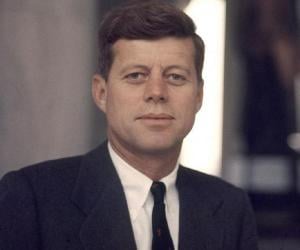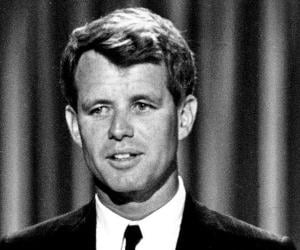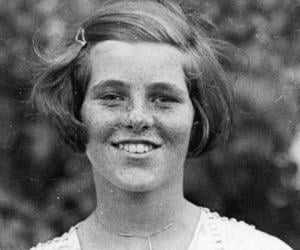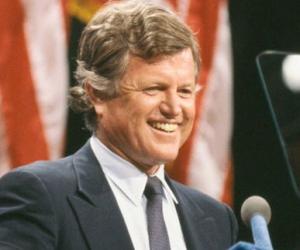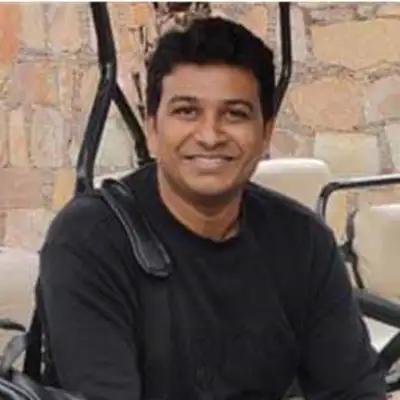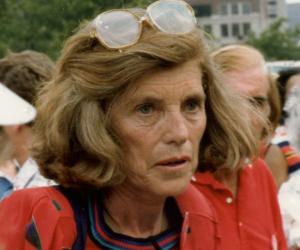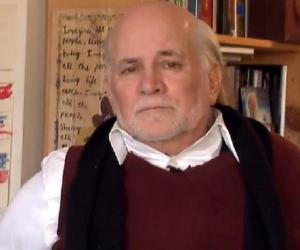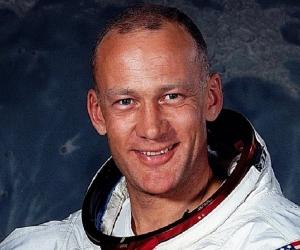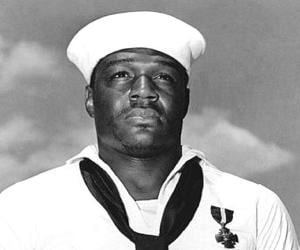Childhood & Early Life
Joseph Patrick Kennedy Jr. was born on July 25, 1915, in Hull, Massachusetts to Joseph P. Kennedy and Rose Fitzgerald Kennedy. His father, Joseph P. Kennedy was a businessman and staunch supporter of the Democratic Party.
Joe attended ‘Dexter School’ in Brookline, Massachusetts, with his brother. Joe was the eldest of nine children born to Kennedy and Rose.
Joe graduated from ‘Choate School,’ a boarding school in Wallingford, Connecticut. He was a quite popular student and skilled athlete during his time in the boarding school.
He, then, attended ‘Harvard College’ and graduated in 1938, keeping his grip in sports such as football and rugby well intact. He also served as student’s council in Harvard.
After graduating, he went to ‘London School of Economics’ and became a protégé of Harold Laski for a year. Thereafter, he enrolled in ‘Harvard Law School.’
Kennedy’s father wanted his son to be the president of the country. From a young age, he groomed his son for to become the first Roman Catholic president of the US.
Joe’s grandfather, John F. Fitzgerald, then Mayor of Boston, even predicted it on a news channel. He said, ‘The child is the future President of the nation.’
However, Joe’s heart was somewhere else. He left law in his final year to enlist in the ‘U.S Naval Reserve’ on June 24, 1941.
He planned to run for ‘Massachusetts's 11th Congressional District’ in 1946. Before that, he wanted to serve the US Navy.
Continue Reading Below
Career
After dropping out from law school, Kennedy started as a volunteer for Navy flier. In 1941, he started his training to be a Naval Aviator and received his wings a year after.
On May 5, 1942, he was commissioned an ensign. He was assigned to ‘Patrol Squadron 203’ and then ‘Bombing Squadron 110.’
He flew patrols in the Caribbean before he was sent to Europe in 1943 to fly with the ‘British Naval Command.’ He joined ‘B-24 Squadron’ in September, 1943.
He was one of the first pilots to fly ‘B-24s,’ the large bombers. His hard work led him to become one of the most experienced combat fighters in the Navy.
He also became a part of a lot of missions while serving in the England, so many that he finally got the chance to return to US. He had completed 25 missions in total when he was in Britain.
He also had the opportunity to become the member of ‘Bomber Squadron 110’ and ‘Special Air Unit ONE,’ later in 1944. Even though, he was given an opportunity to return home, Kennedy refused to do so and decided to remain in the military.
He even advised his crew to stay back and complete more missions. During June and July of 1944, Kennedy constantly flew, striking bombs against the ‘Axis’ forces.
In August, he was again given an opportunity to go to US. This time he stayed back but his crew returned home.
His main reason to stay back was to become the part of a secret mission, more because he was appointed a lieutenant on July 1, 1944. He wanted to volunteer for a dangerous bombing campaign named ‘Operation Aphrodite’ over Normandy, France.
Continue Reading Below
The said operation made Army Air Corps ‘Boeing B-17 Flying Fortress’ and Navy ‘Consolidated PB4Y-1 Liberator’ bombers to crash into their enemies via radio control. The aircraft required two crew members to fly the aircraft to 2,000 feet, release the explosives after activating the control system and jump with a parachute from the aircraft.
Kennedy, along with Lieutenant Wilford John Willy, his regular co-pilot was designated as the first Navy flight crew. On August 12, 1944, two ‘Lockheed Ventura’ and a ‘Boeing B-17’ took off.
Q-8 completed its 2,000 feet round and while Kennedy and Willy remained aboard to remove the pin from the explosives. Kenny used the codeword ‘Spade Flush,’ his last words before the detonation.
Within two minutes of the removal of pin, the explosive detonated and destroyed the Liberator. Willy and Kennedy were both killed immediately.
Remains of the aircraft were found near a village called Blythburgh in Suffolk. As per a source, 59 buildings were damaged after the detonation.
As per an electronics officer, Earl Olsen, there was a design defect in the wiring harness and he claimed to have told Kennedy about the same before the mission. The Navy discussed a number of reasons, from crew making a mistake to jamming of the explosive, but the damage had already been done.
As per his brother. John F. Kennedy, Joe considered the odds at least fifty-fifty, and he never asked for any better odds than that. No final conclusion came out as to the cause of the explosion.
Awards & Achievements
Joe, along with Willy was posthumously awarded the ‘Navy Cross’ and also the ‘Air Medal.’ They were also honoured with the ‘Purple Heart Medal.’
He was also awarded with ‘Distinguished Flying Cross,’ ‘American Defence Service Medal,’ ‘American Campaign Medal’ with one 3⁄16" bronze star, ‘European-African-Middle Eastern Campaign Medal’ with one 3⁄16" bronze star, and ‘World War II Victory Medal.’ In 1946, a destroyer was named ‘USS Joseph P. Kennedy Jr.’ by the Navy to honour his heroism.
Continue Reading Below
His younger brother, John F. Kennedy served the destroyer as an apprentice seaman on the ship for a brief period of time. The ship remained in 27 years of service.
During that time, the vessel took part in the Korean War (1950-53). The ‘US Joseph P. Kennedy Jr. DD850’ served in the U.S. naval blockade of Cuba during the 1962 Cuban missile crisis.
It also participated in the 1960s recovery of various U.S space missions. The destroyer was decommissioned in 1973 and is now a vessel in Battleship Cove, Fall River, Massachusetts.
To honour is courage and heroism, Kennedy family established the ‘Joseph P. Kennedy Jr. Foundation’ in 1947. The Foundation supports people with mental disabilities and aims to provide help in prevention of the causes that lead people to such disabilities.
The family also funded the construction of the ‘Joseph P. Kennedy Jr. Memorial Hall’ at ‘Boston College.’ It is now a part of ‘Campion Hall’ and home to the college’s ‘Lynch Home of Education.’
The foundation of the Memorial Hall was led by U.S Senator and Joe’s younger brother, Ted Kennedy until his death. In 1957, the ‘Lieutenant Joseph Patrick Kennedy Junior Memorial Skating Rink’ was established in Hyannis, Massachusetts.
The skating rink was funded by the ‘Joseph P. Kennedy Jr. Foundation.’
Personal Life
Joe was only 29 at the time of his death. He never got married and never had any children.
Even though, he died without fulfilling his father’s dream to become the president of the US, his younger brother, John F. Kennedy fulfilled that dream. However, John also served the Navy for a brief amount of time.
In 1943, his courage was celebrated when he led his crew to safe shores after their PT boat was hit hard by a Japanese destroyer in Solomon Islands. In 1945, he was honourably discharged by the Navy as he then wanted to focus on politics.
John became the 35th president of America on January 20, 1961. In 1969, Joe’s biography titled ‘The Lost Prince: Young Joe, the Forgotten Kennedy’ written by Hank Searls was released.
The book was also adapted into a TV movie, which won a ‘Primetime Emmy’ in 1977.
